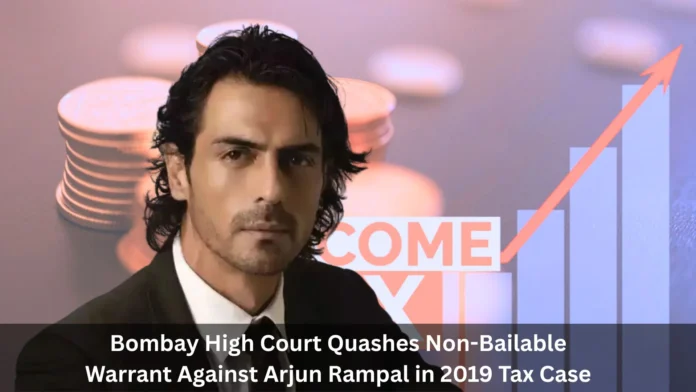Key Takeaways
- Bombay High Court quashes non-bailable warrant against Arjun Rampal in the 2019 tax evasion case, citing lack of legal justification.
- The warrant was deemed “mechanical” and “cryptic,” violating due process for a bailable offence.
- Rampal’s defense emphasized the absence of intent to evade taxes, supported by financial hardship evidence.
- The case highlights critical lapses in procedural fairness and judicial overreach in bailable tax matters.
- The next hearing in the matter is scheduled for June 16, 2025.
Arjun Rampal Gets Relief as Bombay High Court Sets Aside Tax Evasion Warrant
A non-bailable warrant against Bollywood actor Arjun Rampal in a 2019 tax evasion case was revoked by the Bombay High Court in a landmark ruling, characterizing the lower court’s action as a “mechanical” decision made without sufficient application of legal principles. The decision brings clarity to a case that has lingered for years and underscores the importance of judicial prudence in tax-related prosecutions.
The Case That Sparked Legal Controversy
The origins of the case trace back to the assessment year 2016–17 when Rampal was accused by the Income Tax (IT) Department of deliberately evading advance tax payments amounting to ₹42.41 lakh. The allegations triggered a legal process that culminated in a non-bailable warrant being issued by a Mazgaon Magistrate in December 2019.
What intensified the controversy was not just the nature of the allegations but how the court handled them. Rampal, through his legal team comprising senior advocates Ameet Naik, Madhu Gadodia, and Swapnil Ambure, argued that the issuance of a non-bailable warrant was excessive for an offence that is, by statute, bailable and punishable by a maximum of three years in prison.
A Judicial Reprimand: The High Court Examines the Activities of the Lower Court
Hearing the case during a vacation bench, Justice Advait Sethna minced no words in criticizing the lower court’s decision, calling the order “cryptic” and “prejudicial.” He noted that the proceedings had lacked the necessary legal foundation, especially given that the offence was bailable and didn’t require such a stringent directive.
The High Court’s ruling serves as a stark reminder that judicial discretion must align with the principles of natural justice and procedural propriety. It also reaffirmed that mere delay in tax payment, when not coupled with criminal intent, does not constitute wilful evasion.
Zee’s Payment and Frozen Accounts: The Timeline of Events
The legal saga took root in May 2018 when Zee Entertainment Enterprises Ltd., which had engaged Rampal for a professional assignment, received a notice from the Assistant Commissioner of Income Tax. Acting proactively, Zee paid ₹32.40 lakh on behalf of the actor and informed him of the same.
Despite this, the IT department froze Rampal’s HDFC Bank account on February 12, 2019, even going so far as to caution the bank manager of personal liability in case of unauthorized transactions. This was followed by a show-cause notice on February 18, asking Rampal to explain why he shouldn’t face prosecution under the Income Tax Act.
Defense Strategy: No Intent to Evade
Rampal’s defense hinged on the argument that while there had been a delay in paying the dues, there was no criminal intent behind the lapse. He submitted detailed cash flow statements covering the years 2016 to 2018 to demonstrate that he was facing genuine financial distress at the time.
The High Court appeared to agree with this reasoning, recognizing that intent plays a pivotal role in determining culpability in tax-related offences. “Delay is not evasion,” Rampal’s lawyers argued, and the court concurred.
Legal and Ethical Ramifications
This case has broader implications for how tax offences—especially those considered bailable—are treated in courts. The use of a non-bailable warrant in this context raises questions about proportionality and procedural diligence.
Experts argue that the case sheds light on systemic gaps in handling tax prosecutions. “Criminalizing financial delays without examining the underlying causes can set a dangerous precedent,” said a Mumbai-based legal analyst familiar with high-profile tax cases. “The High Court’s ruling helps to recalibrate the balance.”
Due Process vs. Judicial Overreach
The High Court’s scathing assessment of the lower court’s “mechanical” approach touches on a recurring concern in the Indian judiciary: the need to protect due process. By bypassing bail provisions and rushing into coercive actions, trial courts risk undermining public trust in the judicial system.
Rampal’s legal team pointed out that no prior bail conditions had been imposed, making the issuance of a non-bailable warrant not only unnecessary but unlawful. The High Court echoed this view, reinforcing that legal measures must match the severity of the alleged offence.
What Happens Next?
While the warrant has been quashed, the case itself has not been dismissed. The matter is now scheduled for a hearing on June 16, 2025, where the legal proceedings will resume, hopefully under more constitutionally sound circumstances.
Until then, Rampal remains free from custody, and the High Court’s ruling serves as a precedent for how courts should approach tax cases involving bailable offences.
Conclusion
The Bombay High Court’s decision to quash the non-bailable warrant against Arjun Rampal is more than just a win for the actor—it’s a reaffirmation of legal sanity in a system occasionally marred by overzealousness. It emphasizes the importance of balancing justice with procedural fairness and serves as a reminder that tax delays, unless rooted in malice, should not be criminalized. As the legal proceedings resume in 2025, this case may well shape future approaches to tax prosecutions in India.


